okay. normal again.
Opinion Corner
To speak on a more personal level, Hat World scratched an itch I'd had for a self-absorbed /pos. Many indie titles do meet this description, of course. fantasy RPG that breaks the usual expectations.
Despite some clear influences ...To other people. I have never played a SaGa!! , it's far from any typical fanfare in terms of setting, coming closer to the kind of surrealism of a NIS game An opinion I've seen before, but I actually thought it was one at a glance... - wacky sense of humor and all - but not quite leaning into any specific high concept fantasy. And depending on how you approach it, it can really take its sweet time pulling back the curtain, content in its no-questions-asked mystery for as long as it likes.
I hinted in the earlier section about the characters' pre-existing familiarity with the world, and I think this circumvents the usual trappings of "blank slate" fantasy i.e. 100% original, no consistent basis in other fiction, real-life, or zeitgeist. , abstracting the exposition to the benefit of an even larger story. That is to say, almost as soon as any first boss, it makes you aware that the frame of the story would go far beyond the set pieces. But aside from the vague sense of "bigger than it seems" I've been implying all this time, I still have lots to say about how I feel about the game itself...!
Minor spoilers ahead. You have been warned!
Aesthetic and Appeal |
Narrative Thoughts |
Route Order |
Why "RPG Sickos"? |
- |
- |
Is there a "right" order to the routes?
Note: This is about ordering whole routes, not progress within a single story route!
The obligatory answer: if the game intended you to, it would force you to.
There is no "canon" order, and no route "requires" knowledge of another to enjoy. There are some gameplay reasons to which ones you complete first, but other than the fact you should do them one at a time, it's not too important.
However! To say every order feels the same is also wrong - every playthrough gives you new information and impressions of each character, and first impressions are indelible! I found myself wondering throughout, what would it have been like if I had learned certain pieces of info first? Or what if I didn't know about this or that situation?
So rather than a correct order, I think of the question as: "What order would have the best narrative progression?" What would have the most impact based on the information the player has or doesn't have? Are there any that should be consecutive? Does knowing anything first lessen the impact of anything else?
...That said, for maybe the more "authentic" experience, what I actually suggest is that you only take my advice regarding the general order before you start, and let your curiosity about the characters guide you naturally. It's way more fun that way. With that said, you did click this section, so...!

Anchors: Dora first, Mel last.

Purely going off of plot "entanglement", Dora's goals are more personal, so its progression and outcome simply affects the least amount of other people. On top of that, her route hinges on a plot point that ends up being fundamental to almost all the other routes, but explored the least of all.
Mel is kind of the opposite; as the First Keeper, she has involvement with everyone and the whole history of the story, and is casually familiar with more of their circumstances than anyone else. She's a walking spoiler, but it makes her story a better book-end overall.
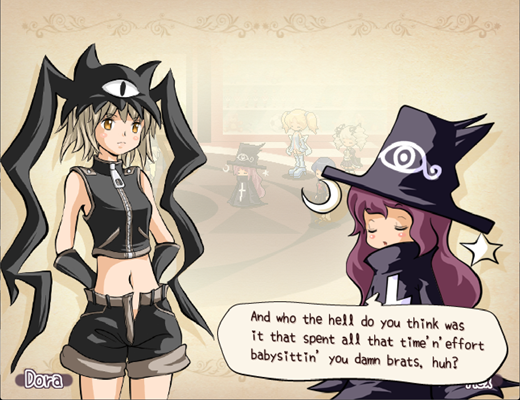

Connected: Lavie and Natalie

You can tell this if you're observant right from the character select screen: these two are joined at the hip. Natalie's sub-character partner is Lavie herself, and Lavie is the only one whose "partner" isn't actually a party member.
They're blatantly codependent, so their stories actually revolve around a similar plot point, but they still go in vastly different directions with it. In my personal playthrough, doing theirs felt like a great middle-of-the-run story, answering some burning questions and presenting wilder ones as if gearing up for a Season 2.
Whenever you do theirs, my personal opinion is that you do Lavie before Natalie, even if it's not one immediately after another. Lavie's route leaves an aspect of Natalie's route a little more ambiguous for longer, even though it does touch on it. It's kind of like they both have the same starting point, and it's about who takes the initiative.
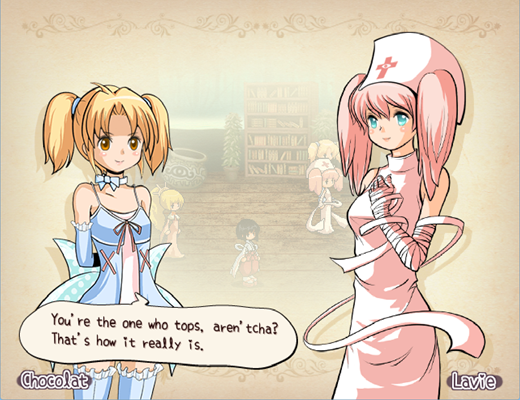

Lore or Impact? Shiki and Janice

I had the toughest time deciding where these two go, and it's because they are probably the two most mysterious characters from an outside perspective. And for kind of different reasons.
On my personal playthrough, I actually had chosen Shiki first, which I don't regret. Her story definitely hit me one of the hardest, and that made for a great hook to the rest of the game. But because of how she's presented in the other characters' routes, I can't help but feel if I had let the anticipation build up, the payoff would have been even better... My bias is showing here, but if I could choose again, I would save her for either after Dora, or closer to the end.
Janice felt mysterious for almost the opposite reason: Outside of her own route, it feels like there's almost nothing to go on. Only her reputation amongst the other girls, which they won't go into very much detail about even in sub-stories. That's why I think waiting to find out what it's like from her perspective plays into the narrative somewhat better... and for other intertwining reasons like Mel, her route actually feels the best after having concluded a good number of other ones first.
But other than the impact, you could probably do hers as soon as after Dora, if you were so inclined. It's actually also pretty self-contained, despite what I said.
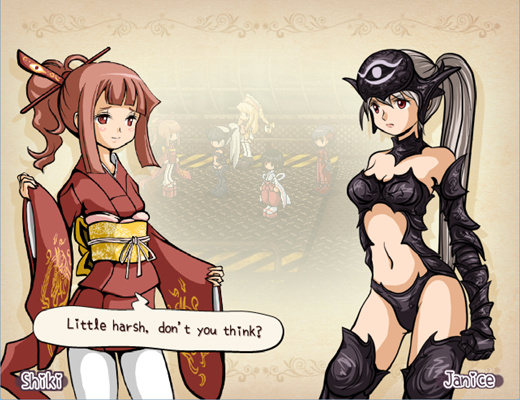
TL;DR
And this is, of course, all based on personal opinion and knowing too much:
Dora or Shiki first. Surprisingly, they don't "spoil" each other's major plot points that much, but Dora's story gets impacted the worst by completing other routes.
Lavie some time before Natalie, and then Janice (and Shiki if you hadn't yet) whenever you feel curious about them. And of course, End with Mel.
I'll just say it right out.
This game is so fun all the time.
And I mean that in terms of the design, the writing, the little bits of flavor like attack animations, enemy designs and descriptions. It checks off all boxes that make me think, the game developer must have had the time of their life making this game free for people to enjoy.
The character designs are all over the place. They're anachronistic, nonsensical, multi-genre, but all have a very particular cuteness to them. Even characters that are in more serious outfits, or otherwise not designed to be "cute" in that way, hit a kind of dated (but evergreen!!) sense of "because I felt like it" approach to anime character designs of yesteryear - no cohesion or explanation, or trying to appeal to a standard, just things that look neat.
And to me, nothing is cuter than being unafraid to appeal to such an unmarketable sensibility!!
The secret Conceptual Cute!!
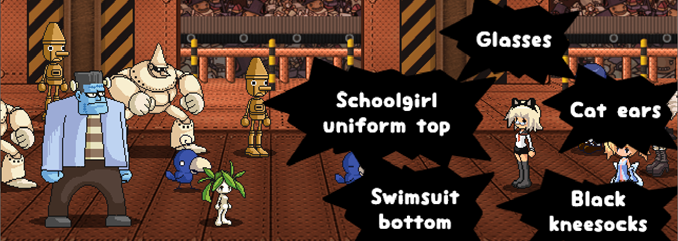
Not that kind.
And then there are the world settings, which go far and wide across fantasy genres. You might get a magical forest in one, and then a high tech factory in another, but because of the way the game is presented, this is simply taken for granted. It's a game truly made for RPG sickos that know exactly what to expect, even if there's no in-universe cohesion.
And because it assumes this of you, it never risks a behind-the-curtain look - something I feel like modern games, and modern gamers, crave like junk food or like if fandom wikia was crack. . The game's theming seems so simple, so predictable even, that when something seems off you can't exactly explain why. But the characters mostly already know the score, so they very rarely provide an excuse for a proper explanation. And that's awesome.
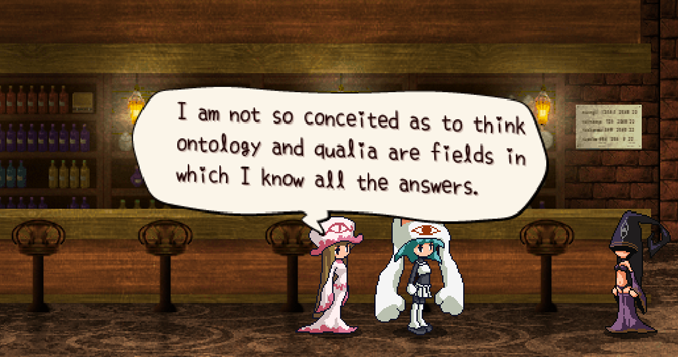
It's as shrimple as that
I mentioned in passing how despite all this originality, the game does use some free external assets, particularly the music - it is after all a one-man RPGMVX Ace project. I think?? It's heavily modified.
But this isn't to be detracted from the finished product, as careful use of these things makes a huge difference. And I want to give credit where it's due - the BGM choices are always perfectly fitting, and also fantastic tracks on their own merit.
I'm a firm believer in musical spoilers You only get one first impression to hear it in context! - even moreso than information spoilers - so I don't want to directly link to anything that's too impactful. But, here's a sample from a protagonist's "home base":

As much as I would love to go on and on and on about this, it would necessitate heavy spoilers for the entire game. And furthermore, I've already done it!
For now, I'm going to link to my few Cohost posts made summarizing the experience in real-time:
- 8/17/23 - Post made after finishing 1.5 routes Shiki, half of Dora
- 11/27/23 - Variety post, Hat World at the end. 2 more routes finished. The rest of Dora, and Lavie
- 12/30/23 - Short post. 6 routes cleared.
- 2/28/24 - Final post, full thoughts on all routes.
As a bonus, I also want to point to this great review, so long as Cohost remains readable... It has a much more succinct review than this hellish 1000 word pile-up did!
The last sections are reserved for post-game, but the choster does warn to come back after punching the final boss.
In the end, all I can really say is that it truly was a Hat World: New Testament.
I keep saying this game is for RPG sickos for two reasons:
- It's layers deep in RPG tropes that make no damned sense to anyone else
- The very game design itself is made to be broken wide open
And I feel like I harped on point #1 quite a bit in other sections already, so instead I'm gonna harp on point #2 here!
This section does have some significant spoilers.
First of all, what is a normal RPG?
I'll start by saying I do think it is faux pas to restrict something to a genre, much less judge its validity or quality based on meeting a set of requirements. To a perceiver, the categorization is an approximation of what it presents, and to a creator, their inspirations and basis are inseparable from what they produce. So what, then, makes something out of the ordinary? It's a question without a concrete answer, but opinions are what I said I'd offer.
To me, your standard turn-based RPG has a design philosophy that introduces a combat system, and a progression system, and then pushes them to natural extremes. Challenges are set along a road that tests your fluency with the tools given to you, balancing difficulty around your ability to act with logic and foresight. Roles are well-defined, toolkits serve a logical purpose with clear and relatively balanced benefits and tradeoffs, and the metagame of choosing what gets you through an encounter lends to a consistent experience that rewards not just the in-game character growth, but the development of your own understanding. And by the end of it, the fruits of your labor are reflected in how your careful choices have paid off with good hard work.
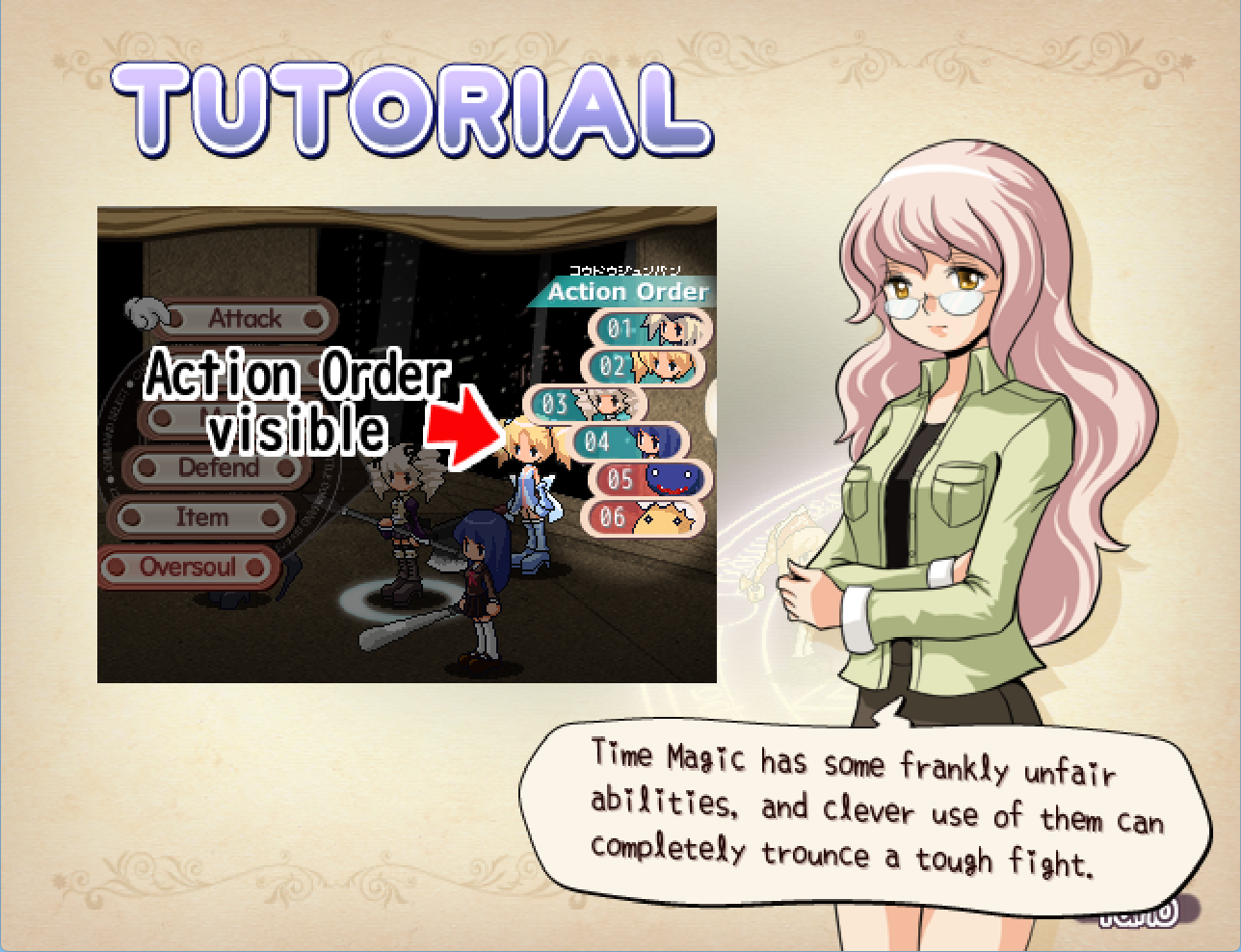
Hey wait what does that mean
Even classic RPG's aren't free from the occasional game-breaking strategy, but not many of them hit you up in the tutorial and just tell you what it is. And they aren't kidding - a turn-based RPG giving you access to something that directly affects turn structure is no joke. The ability to no-sell a timed boss phase, to bypass priority issues entirely, to hit a reset button to just say that last turn didn't actually happen.
It's a high that can't be beaten once you've broken the seal, and it's not even the only one in the game. It's like it wants you to have the tools to punch holes in its delicate balance whenever you feel like it!
But let me be clear: This is a warning sign.
When an exploit is found in other games, it's something that overcomes the intended game design and method of play. It's a symbol of the developer's lack of foresight, or more charitably the ingenuity of the player surpassing their programmed restraints.
It's "unfair" to the purist-type player The "authentic experience" IS important for immersion! , a triumph for challenge runners, a point of criticism for the skeptic, an added layer of interactivity for fun lovers.
But if the terms were laid out in-game that the creator clearly knows about this apparent imbalance... well, they certainly didn't intend on trivializing their own game.
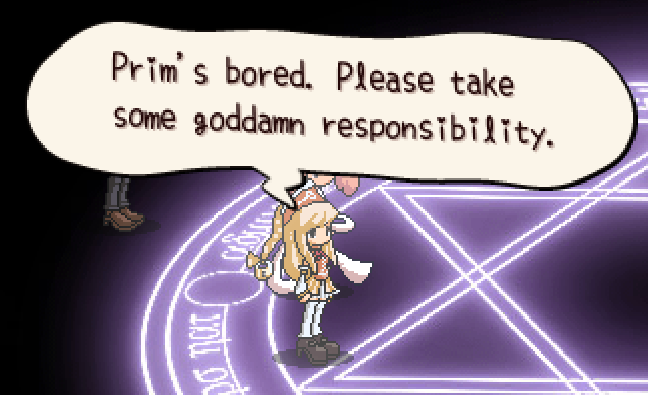
Every significant challenge in the game takes the training wheels off. No more standard hit and hit back encounters. You have to contend with so much, so many added crises the game did not prepare you for, that not even your broken kit can be the one-stop solution.
Maybe the boss themself gains access to what you thought was a player advantage. Maybe their assault is so overwhelming not even a hard timeout is enough to keep up. Maybe it demands you beat them in an offense race you're sorely outpaced in.
You're going to use everything you have, every deus-ex-machina, every busted ability, with the most preparation you can muster, and still struggle to cross that finish line.
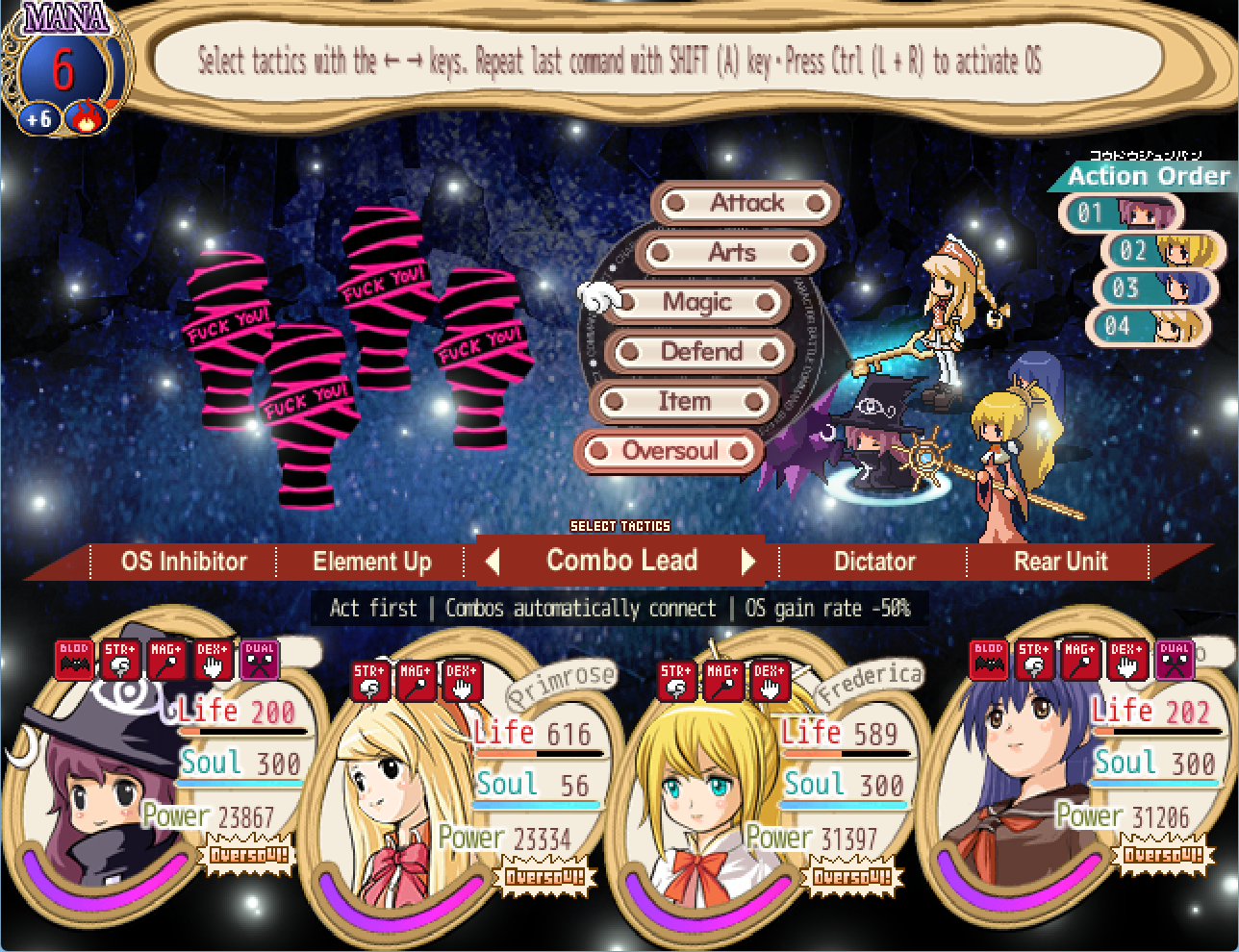
Your mileage will vary.
I exaggerate for effect, and leave an obligatory disclaimer that I consider myself of pretty standard skill overall when it comes to game strategy. But I think that makes me well suited to say with utmost certainty that this game expects much of its player, in a positive way. It believes with full respect that you can crack it wide open. It appeals to those who can and will challenge it, but not with the malicious intent of rage games - more like the shared joy of discovery that the genre you love can still be pushed so far.
And if you make it all the way to the very very end, there's no way you can't say it hasn't done something irreparable to your brain chemistry.